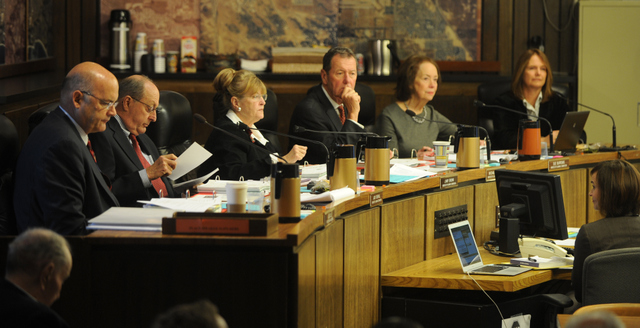Miramar Languishes in Limbo Amid Parking Concerns
Commissioners, Neighbors Worry About Limited Space in the Posh Montecito Neighborhood

One word came to would-be Miramar Hotel developer Rick Caruso on Monday: limbo. After a six-hour hearing in which dozens of Montecito residents expressed impatience over the years of talk of reviving the hotel as they also voiced strong concerns about its effects on neighborhood parking, the Montecito Planning Commission voted unanimously to postpone a final decision on a newer, smaller Miramar proposal until January 21, 2015.
In August, Caruso — who has had two previous iterations of the hotel approved by the County Board of Supervisors in 2008 and 2011, only to see those projects stall for different financial reasons — submitted his third application and has since erected story poles on the property and earned the wholehearted endorsement of the Montecito Association. Caruso’s third bid scaled back the number of rooms from 186 to 170, decreased the overall square footage, and tailored the exterior into more of a Montecito-friendly, Cottage-style aesthetic. But with that cozier design came fewer parking spaces than previously proposed, down to 436 on-site spots compared to the 494 previous that would have been a mix of on-site and underground.

The parking issue was raised in a letter from a Pasadena law firm representing a Miramar Avenue resident worried that parking at her home would be imperiled by the project. The concern was seconded by commissioners who said that those 436 spots — 59 of which would dot the entry area, oceanfront, and Miramar Avenue — wouldn’t be sufficient for a 170-room hotel with amenities for nonguests, including a beachfront restaurant, spa, and beach club. The proposal also included 89 spots set aside for public parking — a slight jump from the 82 public spots in the last proposal — but it was not enough to assure the commissioners that beachgoers, hotel guests and employees, and neighbors wouldn’t find themselves in a constant battle for parking.
The attorney heading that law firm, Robert Silverstein, has gone toe-to-toe with Caruso in the past, representing a Glendale hotel owner who didn’t want to sell his property to Caruso for the developer’s Americana at Brand project. Silverstein’s website also cites several successful cases filed under the California Environmental Quality Act (CEQA) and the Public Records Act (PRA), two laws on which Silverstein based his letter to the Montecito Planning Commission. In his letter, the attorney alleged that certain documents related to the Miramar proposal weren’t made available on time — a violation of CEQA — and that a PRA request his firm submitted to the Montecito Water District regarding the hotel plans wouldn’t be realized until after this week’s meeting. In his letter — submitted four days ahead of the Monday meeting — Silverstein lobbied to have a final decision delayed on those grounds.
Silverstein’s client, as well as the commissioners, also raised concerns about the hotel’s water use. The property — with five water meters on site, the first of which was installed in 1924 — is considered an existing district customer, said district general manager Tom Mosby, and would be granted 45 acre-feet per year; if it were to exceed that supply, fines would be imposed. Mosby said the district expects to have 2,600 acre-feet available overall for the next water year, which is half the amount when the rationing ordinance was imposed earlier this year.
Reducing Silverstein’s letter to “smoke screens,” Matt Middlebrook, Caruso’s right-hand man, repeatedly told the commissioners that the developers, who were shooting for construction to start in June 2015 with an opening in 2017, would do everything to ensure the operation — estimated to cost $200 million on Caruso’s dime — ran smoothly. “We will make this work,” Middlebrook said. “And if it’s not, we will invest the resource to make sure it does. We’re not going to let a $200 million investment not work.”
A heated Caruso made his frustration clear toward the end of the hearing, after the commissioners had all but voted to delay making a final decision. Caruso, the third developer to try to get a reimagined Miramar off the ground in the last 15 years — Studio 54 cofounder Ian Schrager was the first, followed by Ty Warner — reminded the commission that he already has a larger-scale project approved. “What I can’t afford to do is to be in limbo,” Caruso said, asking that the commissioners vote on the third revision rather than postpone their vote. “Take a vote, and if you don’t like this project, vote it down. But we’re not changing it. I’m fine building the other project.” After the meeting, Middlebrook declined to comment on what Caruso will do next.



